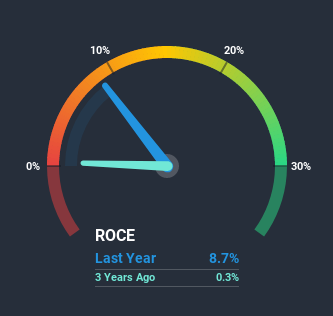- South Korea
- /
- Communications
- /
- KOSDAQ:A211270
Will Asia Pacific Satellite (KOSDAQ:211270) Multiply In Value Going Forward?
To find a multi-bagger stock, what are the underlying trends we should look for in a business? Amongst other things, we'll want to see two things; firstly, a growing return on capital employed (ROCE) and secondly, an expansion in the company's amount of capital employed. Put simply, these types of businesses are compounding machines, meaning they are continually reinvesting their earnings at ever-higher rates of return. In light of that, when we looked at Asia Pacific Satellite (KOSDAQ:211270) and its ROCE trend, we weren't exactly thrilled.
What is Return On Capital Employed (ROCE)?
For those who don't know, ROCE is a measure of a company's yearly pre-tax profit (its return), relative to the capital employed in the business. Analysts use this formula to calculate it for Asia Pacific Satellite:
Return on Capital Employed = Earnings Before Interest and Tax (EBIT) ÷ (Total Assets - Current Liabilities)
0.087 = ₩7.3b ÷ (₩119b - ₩36b) (Based on the trailing twelve months to September 2020).
So, Asia Pacific Satellite has an ROCE of 8.7%. On its own that's a low return, but compared to the average of 7.2% generated by the Communications industry, it's much better.
Check out our latest analysis for Asia Pacific Satellite

While the past is not representative of the future, it can be helpful to know how a company has performed historically, which is why we have this chart above. If you're interested in investigating Asia Pacific Satellite's past further, check out this free graph of past earnings, revenue and cash flow.
What The Trend Of ROCE Can Tell Us
On the surface, the trend of ROCE at Asia Pacific Satellite doesn't inspire confidence. To be more specific, ROCE has fallen from 32% over the last five years. Although, given both revenue and the amount of assets employed in the business have increased, it could suggest the company is investing in growth, and the extra capital has led to a short-term reduction in ROCE. If these investments prove successful, this can bode very well for long term stock performance.
On a side note, Asia Pacific Satellite's current liabilities have increased over the last five years to 30% of total assets, effectively distorting the ROCE to some degree. Without this increase, it's likely that ROCE would be even lower than 8.7%. Keep an eye on this ratio, because the business could encounter some new risks if this metric gets too high.
In Conclusion...
Even though returns on capital have fallen in the short term, we find it promising that revenue and capital employed have both increased for Asia Pacific Satellite. And the stock has done incredibly well with a 141% return over the last three years, so long term investors are no doubt ecstatic with that result. So while the underlying trends could already be accounted for by investors, we still think this stock is worth looking into further.
If you'd like to know more about Asia Pacific Satellite, we've spotted 3 warning signs, and 1 of them is potentially serious.
While Asia Pacific Satellite may not currently earn the highest returns, we've compiled a list of companies that currently earn more than 25% return on equity. Check out this free list here.
When trading Asia Pacific Satellite or any other investment, use the platform considered by many to be the Professional's Gateway to the Worlds Market, Interactive Brokers. You get the lowest-cost* trading on stocks, options, futures, forex, bonds and funds worldwide from a single integrated account. Promoted
New: Manage All Your Stock Portfolios in One Place
We've created the ultimate portfolio companion for stock investors, and it's free.
• Connect an unlimited number of Portfolios and see your total in one currency
• Be alerted to new Warning Signs or Risks via email or mobile
• Track the Fair Value of your stocks
This article by Simply Wall St is general in nature. It does not constitute a recommendation to buy or sell any stock, and does not take account of your objectives, or your financial situation. We aim to bring you long-term focused analysis driven by fundamental data. Note that our analysis may not factor in the latest price-sensitive company announcements or qualitative material. Simply Wall St has no position in any stocks mentioned.
*Interactive Brokers Rated Lowest Cost Broker by StockBrokers.com Annual Online Review 2020
Have feedback on this article? Concerned about the content? Get in touch with us directly. Alternatively, email editorial-team (at) simplywallst.com.
About KOSDAQ:A211270
Asia Pacific Satellite
Develops and manufactures satellite communication devices worldwide.
Flawless balance sheet with weak fundamentals.
Market Insights
Community Narratives



